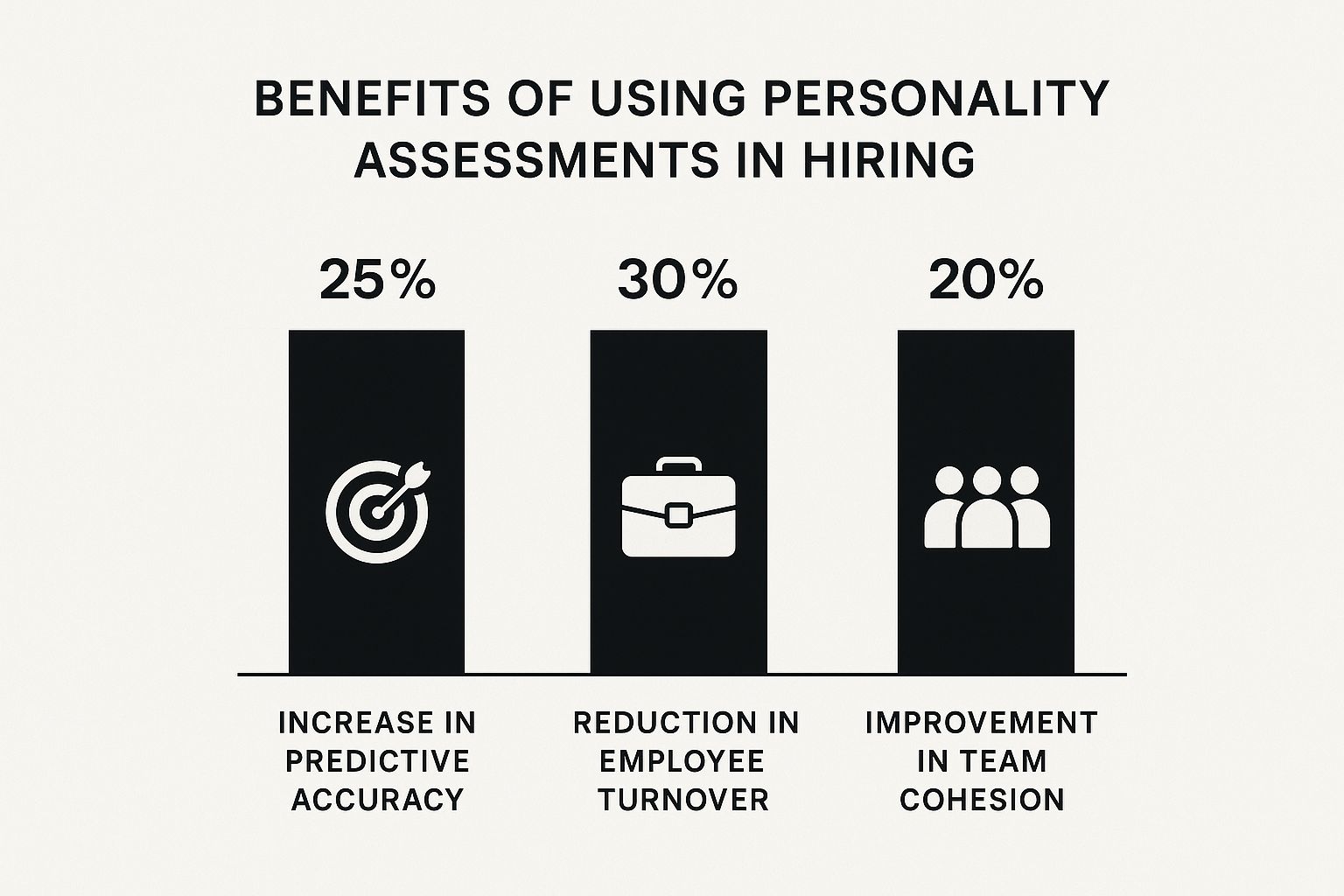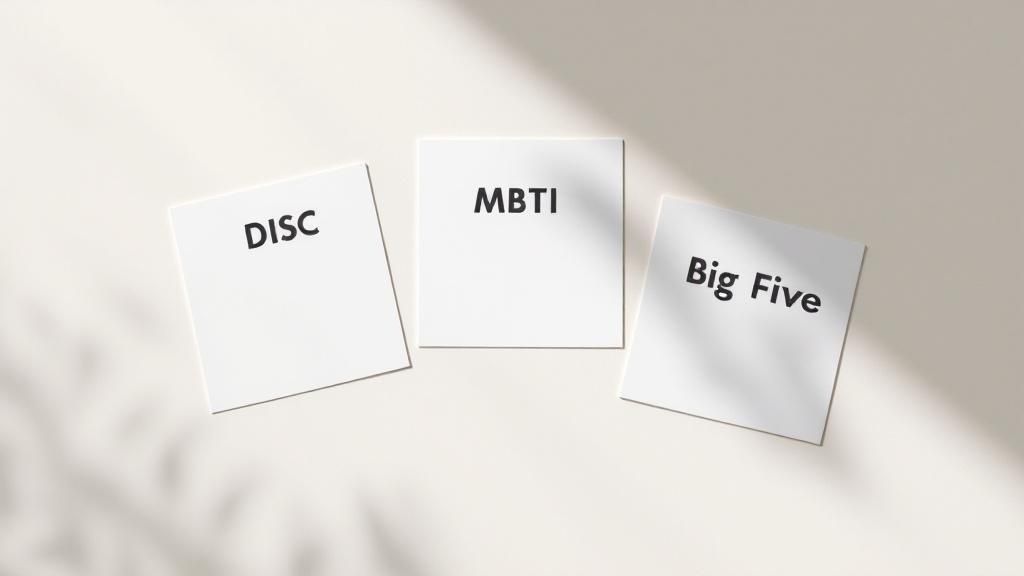August 8, 2025
Enhance Your Hiring Process with Personality Assessments for Hiring

When you're hiring, you're looking for more than just a list of skills on a resume. You're looking for a person. Personality assessments are tools designed to give you a glimpse into who that person really is—what drives them, how they approach their work, and what their natural behaviors are.
These assessments go beyond the resume to help predict how someone will perform on the job, whether they’ll mesh with your team, and ultimately, help you build a more cohesive and productive workforce.
Moving Beyond the Resume in Modern Recruitment

Let's be real for a moment. Resumes and even traditional interviews only show you a sliver of the full picture. A candidate can look perfect on paper, ticking every box for experience and qualifications, but still lack the resilience, collaborative drive, or conscientiousness your team desperately needs. That gap between skills and suitability? That's where expensive hiring mistakes happen.
This is why so many smart companies are now using personality assessments as a core part of their hiring strategy. Think of it like this: a resume tells you what a person has done, but a personality assessment reveals how they are likely to do it in the future. It’s a fundamental shift away from gut-feel hiring toward a more objective, data-backed approach that’s quickly becoming essential.
Why the Shift to Objective Data?
Relying on interviews alone is risky. It’s human nature to be swayed by unconscious bias, where a good first impression or a shared alma mater can easily cloud our judgment of a candidate's actual ability. Personality assessments add a standardized, impartial layer of data that helps level the playing field for everyone. They bring to light the core traits that are consistently proven to predict success on the job.
For instance, think about high-stakes professions like airline pilots. Companies in that field rely heavily on assessments to measure critical traits like stress tolerance and emotional stability. These aren't qualities you can easily spot in a 45-minute chat, but they are absolutely vital for performance and safety.
The proof is in the numbers. The global market for personality assessment solutions is booming, growing at a compound annual rate of 11.2% from 2019 to 2023 and hitting a value of roughly $8.75 billion. This isn't just a fleeting trend; it’s a clear signal that businesses everywhere are getting serious about improving hiring accuracy. You can dive deeper into the data in this market growth report on personality assessments.
The Strategic Advantage of a Deeper Look
Using personality assessments isn’t just about picking the "right" candidate. It’s about making smarter, more strategic talent decisions that pay off in the long run.
Here’s what that deeper insight helps you do:
- Build Stronger Teams: When you know the personality makeup of your current team, you can hire people who complement existing strengths and fill in the behavioral gaps. It's how you turn a group of individuals into a truly collaborative unit.
- Improve Employee Retention: A person whose personality is a natural fit for both the role and the company culture is far more likely to feel engaged and satisfied. That strong alignment is one of the best ways to reduce costly early turnover.
- Predict Future Performance: For many roles, specific personality traits are reliable predictors of high performance. By identifying these traits early on, you get a much clearer sense of a candidate's potential to succeed and grow with your company.
Decoding the Most Popular Assessment Models
Stepping into the world of personality assessments can feel like trying to decipher a secret code. You'll see acronyms like DISC, MBTI, and OCEAN tossed around, but what do they actually tell you about a potential hire? Getting a handle on these models is the first step to picking the right one for your team.
Think of it like this: if you were an artist, you'd start with your primary colors. For personality assessments, the "Big Five"—or OCEAN model—is your set of primary colors. It's the most scientifically respected framework and gives you the fundamental building blocks to understand the more nuanced "shades" of workplace behavior.
The Big Five (OCEAN) Model
The reason the Big Five gets so much respect in the field is that its five core traits have proven to be remarkably consistent across different cultures and are great predictors of real-world outcomes. It’s not about stuffing people into rigid boxes; it's about seeing where they land on a spectrum for each key personality dimension.
Let's break down what OCEAN stands for:
- Openness: This is all about a person's curiosity, imagination, and appetite for new things. Someone high in openness is adventurous and thinks outside the box, which is a huge plus for roles in R&D, design, or creative strategy.
- Conscientiousness: If there's one trait that consistently predicts job success across the board, this is it. It measures how reliable, organized, and detail-oriented someone is. A highly conscientious employee is someone you can count on to get the job done right.
- Extraversion: This dimension covers sociability and how a person gets their energy. Extraverts are outgoing, thrive in group settings, and are often a natural fit for sales, business development, or other client-facing roles.
- Agreeableness: This trait reflects how cooperative, compassionate, and good-natured a person is. High agreeableness is essential for roles that demand strong teamwork, customer support, and building positive relationships.
- Neuroticism (often called Emotional Stability): This gauges how well someone handles stress and pressure. A person with high emotional stability (low neuroticism) stays calm and resilient, a critical asset in any fast-paced or high-stakes job.
By looking at a candidate's OCEAN profile, you get a much richer understanding of their natural tendencies and how they're likely to handle the day-to-day realities of the job.
The infographic below highlights just how much of an impact these assessments can have when properly integrated into the hiring process.

As you can see, this isn't just academic theory. Using these models brings real, measurable improvements to everything from hiring accuracy to employee retention and team chemistry.
Other Common Frameworks You'll Encounter
While the Big Five offers a solid scientific backbone, other popular models provide different, often more specific, lenses for looking at personality in a work context. To help you navigate these, here’s a quick comparison of the most common ones you'll see.
Comparing Popular Personality Assessment Models
Let's dig a little deeper into the two most common alternatives.
The DISC assessment is popular because it’s so focused on observable behavior. It sorts people into four main styles:
- Dominance (D): Direct, ambitious, and results-focused.
- Influence (i): Enthusiastic, collaborative, and persuasive.
- Steadiness (S): Calm, supportive, and dependable.
- Conscientiousness (C): Analytical, precise, and systematic.
The beauty of DISC is its simplicity. It’s fantastic for figuring out team dynamics—like making sure your project team has a good mix of decisive leaders (D), energetic communicators (i), supportive team players (S), and detail-oriented analysts (C).
Then there’s the Myers-Briggs Type Indicator (MBTI), probably the most famous personality test out there. It assigns people to one of 16 personality types based on where they fall on four spectrums:
- Introversion (I) vs. Extraversion (E)
- Sensing (S) vs. Intuition (N)
- Thinking (T) vs. Feeling (F)
- Judging (J) vs. Perceiving (P)
While the MBTI is widely used for personal growth and team building, its value in hiring is a hot topic of debate. It's generally considered less reliable for predicting job performance than the Big Five. Think of it as a great conversation starter for development, not a go/no-go hiring filter. Getting these distinctions right is covered in more detail among these https://www.klearskill.com/blog-post/8-essential-hiring-manager-tips-for-2025.
Of course, a well-rounded hiring process looks beyond just personality. For technical roles, you also need to rigorously evaluate hard skills. A resource like A Guide to Developer Skills Assessment can be invaluable for creating tests that truly show you what a candidate can do. The real magic happens when you combine the right personality insights with the right skills assessments to get a complete picture of your candidate.
Unlocking the Benefits of Data-Driven Hiring

When you weave personality assessments for hiring into your recruitment strategy, you stop relying on guesswork and start making predictive, data-driven decisions. The benefits go far beyond just checking boxes on a skills list; these tools give you a blueprint for building teams that are more cohesive, resilient, and effective from day one.
The real advantage is gaining a much deeper, more objective look at who a candidate truly is and how they'll likely behave on the job. A resume tells you what they've done, but an assessment reveals the crucial traits—like conscientiousness or emotional stability—that often separate a good hire from a great one. It’s about matching the whole person to the whole job, not just their experience.
Imagine you're hiring a software developer and have two candidates with identical technical skills. An assessment might show that one is a natural collaborator who thrives in team settings, while the other is more of a methodical, independent worker. That single piece of data empowers the hiring manager to pick the person who truly fits the team’s current needs.
Improve Team Dynamics and Collaboration
Building a powerhouse team is a lot like putting together a championship sports team—you need more than just a roster of all-stars. You need people whose individual work styles and strengths actually complement one another. Personality assessments provide the data to create that synergy, helping you find candidates who will elevate your team culture, not clash with it.
By understanding the behavioral DNA of your current team, you can hire strategically to fill any gaps. Do you need a calm, steadying presence to balance out a group of creative trailblazers? Or maybe a driven, assertive leader to take charge of a new project? Assessments give you the hard data to answer these questions confidently.
One of the key advantages of personality tests is their ability to identify candidates who will fit well within the company culture. This reduces the likelihood of turnover due to mismatches in personality and the workplace environment.
This proactive approach to team building helps you get ahead of potential personality conflicts and communication friction, creating a more collaborative and productive environment right from the start.
Reduce Costly Employee Turnover
One of the most immediate and tangible returns you'll see from using personality assessments is a significant drop in employee turnover. It’s simple: when an employee's natural personality is a great match for their role and the company culture, they're far more likely to feel engaged, satisfied, and motivated to stay.
This strong job and culture fit has a direct impact on retention. Think about it:
- Better Role Alignment: Putting a highly agreeable and empathetic person in a customer support role is a recipe for their success and satisfaction.
- Stronger Cultural Connection: Someone who thrives on structure and clear processes will flourish in an organized company but might feel lost in a chaotic startup.
- Increased Job Satisfaction: Employees who get to use their natural strengths every day report much higher levels of engagement and are less likely to look for other jobs.
Getting this alignment right from day one is one of the most powerful things you can do to build a loyal, long-lasting team. For a closer look at refining your entire hiring funnel, you can learn more about how to improve your recruitment process and integrate these tools effectively.
Uncover Hidden Potential and Leadership Qualities
Let’s be honest, the best candidate doesn’t always have the most polished resume. Traditional screening methods can easily overlook people with incredible potential but a non-traditional career path. Personality assessments help level the playing field by revealing strengths that interviews alone often miss.
A candidate who seems quiet and reserved in an interview might score off the charts in conscientiousness and problem-solving, signaling that they could be a highly reliable and detail-oriented future leader. To see how these tools can unlock executive success, you can find great resources on personality tests for business leaders. By looking beyond the surface, you open yourself up to a much more diverse and capable pool of talent.
How AI Is Revolutionizing Personality Assessments

Artificial intelligence is taking personality assessments for hiring well beyond the old-school multiple-choice questionnaires. Instead of just asking candidates how they think they'd act, AI-powered platforms can actually observe their behavior in real-time. The result is a more engaging, insightful, and frankly, more objective hiring process.
This isn't just a minor upgrade. It’s a complete reimagining of how we measure a person's potential.
Think of it this way: a traditional assessment is like a written driving test. It tells you if the candidate knows the rules of the road. But an AI-driven assessment is more like a high-tech driving simulator. It puts the candidate into realistic situations and measures their reflexes, decisions, and problem-solving skills as they go. This gives you a much richer, more complete picture of how someone really operates under pressure.
This shift delivers a powerful one-two punch of efficiency and fairness in hiring.
Moving From Self-Reporting to Behavioral Analysis
The single biggest change AI introduces is the move away from self-reported answers, which, let's be honest, can be easily fudged. Instead, AI tools gather data from dynamic, interactive activities, giving you a much clearer window into a candidate's natural tendencies.
This is where some truly innovative platforms are making a name for themselves. Companies like Pymetrics and HireVue are leading the charge, using everything from neuroscience-based games to AI-powered video analysis to get a handle on cognitive and emotional traits. The results speak for themselves. Pymetrics, for example, saw a 25% increase in diverse hiring after implementing their AI tools. Meanwhile, organizations using HireVue's video analysis have been able to cut their time-to-hire by 50%.
These tools aren't just faster—they're uncovering dimensions of personality that a static test could never hope to capture.
- Gamified Challenges: Instead of a bubble-in survey, a candidate might play a series of short, engaging online games. The AI doesn't care if they "win." It's analyzing the process—how they strategize, how they adapt when the rules change, and how they handle a bit of frustration.
- Video Interview Analysis: AI can analyze a candidate's recorded video interview, looking at things like word choice, vocal tone, and speech patterns to gauge traits like confidence or communication style.
This multi-layered approach to data creates a far more nuanced and reliable profile of who you're considering.
AI assessments move the focus from what candidates say about themselves to what their actions reveal. This shift toward behavioral data is key to reducing bias and improving predictive accuracy in hiring.
The Benefits of AI-Powered Assessments
Bringing AI into your assessment strategy offers real, tangible benefits for both your recruiting team and your candidates. It automates the monotonous work, serves up deeper insights, and helps level the playing field. If you're looking to dip your toes in the water, a well-designed AI assessment tool can be a fantastic starting point for building a more modern evaluation process.
The key benefits really boil down to these three things:
- Reduced Unconscious Bias: AI algorithms run on data, not gut feelings. By standardizing the evaluation criteria across the board, they help strip away the unconscious biases related to gender, age, or background that can all too easily slip into human-led interviews.
- Enhanced Candidate Experience: Let's face it: no one gets excited about filling out long, repetitive questionnaires. Gamified assessments feel more modern and are genuinely more engaging, leaving candidates with a much better impression of your company, regardless of the outcome.
- Deeper, More Predictive Insights: By measuring behavior directly, AI can spot core aptitudes for things like creativity, problem-solving, and learning agility—crucial traits that are nearly impossible to gauge from a resume alone.
This deeper analysis is a cornerstone of the broader shift toward using AI for talent acquisition, where data, not guesswork, drives the entire hiring funnel. Ultimately, AI turns the personality assessment from a simple screening checkbox into a strategic tool for finding top-tier talent with real, long-term potential.
Here's a rewritten version that sounds more human and expert-driven, following all the specified requirements.
A Practical Guide to Implementing Assessments
So, you’re thinking about adding personality assessments to your hiring process. That's a great move, but let’s be clear: this isn’t about just tacking on another step. It’s about being more intentional and strategic. To get it right, you need a solid game plan, from figuring out what a "great hire" actually looks like to teaching your team how to read the results without bias.
This isn't about finding a magic test. The journey starts with a simple, powerful question: for this specific role, what does success truly look like?
Step 1: Define Your Success Profile
You can't hit a target you can't see. Before you even think about a test, you need to build a "success profile"—a detailed blueprint of the traits, behaviors, and skills that your best people already have. This is so much more than a job description. It’s about mapping the personality DNA of your top performers.
Look at your current team. Who are your absolute rockstars? What makes them tick? Are they the ones who are incredibly organized and detail-oriented? The ones who are naturally outgoing and build relationships effortlessly? Maybe it's their resilience when things get tough. Digging into this gives you a real, data-backed picture of what works in your company culture.
- For a Sales Role: You’re likely looking for high levels of extraversion, a healthy dose of assertiveness, and the grit to bounce back from rejection.
- For an Engineering Role: Deep conscientiousness, a love for complex problem-solving, and an openness to new ideas are probably at the top of your list.
- For a Customer Support Role: Empathy, patience, and the ability to stay cool under pressure are almost certainly non-negotiable.
Once you have this profile nailed down, you have a clear target. Now you can find the right tool to help you spot candidates who fit that mold.
Step 2: Choose the Right Assessment Tool
Let's be honest: not all personality tests are created equal. The market is flooded with options, but the key is to find one that is scientifically sound and actually measures the traits you identified in your success profile. A generic, one-size-fits-all quiz won’t cut it. You need a tool that’s relevant to the job.
Don’t forget about the candidate’s experience, either. Clunky, outdated tests are a turn-off. Modern platforms that use engaging formats, like gamified challenges, can actually improve completion rates and make your company look good. Remember, this is one of the first real interactions a candidate has with your brand.
The goal of these tests is not to label someone as "good" or "bad" but to understand whether their personality aligns with the requirements and values of the company. A well-chosen assessment provides objective data, not a final judgment.
Step 3: Integrate Strategically into Your Hiring Funnel
Timing is everything. Where you place the assessment in your hiring process can make or break its effectiveness. If you ask everyone to take it right after they apply, you’ll drown in data and create a barrier for great candidates. If you wait until the final round, you've missed the chance to use those valuable insights to guide your interviews.
For most roles, the sweet spot is right after the initial resume screen but before the deep-dive interviews. This way, the assessment results can help you craft smarter, more targeted interview questions. For instance, if a promising candidate scores a bit lower on conscientiousness, you know to ask specific behavioral questions about how they organize their work and handle details.
Step 4: Train Your Team and Ensure Compliance
Handing a personality assessment to an untrained hiring manager is like giving a scalpel to someone who isn't a surgeon—it can do more harm than good. It is absolutely critical that your team knows how to interpret the results correctly. The most important lesson? A test score is just one data point among many.
Here are the non-negotiables for your team:
- Use as a Guide, Not a Gatekeeper: The results should open up a conversation, not slam the door on a candidate. They’re there to add context, not make the decision for you.
- Maintain Legal Compliance: Make sure any assessment you use is validated for employment and doesn't discriminate against protected groups. This is a massive legal and ethical responsibility.
- Communicate Transparently: Be upfront with candidates. Tell them why you're using an assessment and how you'll use the results. A little transparency goes a long way in building trust.
By following these steps, you can start using personality assessments for hiring in a way that’s fair, incredibly effective, and adds real, measurable value to how you find and hire great people.
The Future of Talent Intelligence
https://www.youtube.com/embed/_ThPFwNGp0w
Personality assessments are breaking out of their traditional hiring box. For years, we've thought of them as a simple screening tool for new applicants. But that’s changing. The conversation is now about building a continuous, strategic approach to understanding people, making these assessments a cornerstone of a much larger talent intelligence ecosystem.
This shift isn't happening in a vacuum. It's being pushed forward by huge changes in how we work, especially with remote and hybrid teams becoming the norm. Companies are waking up to the fact that an employee's personality isn't just important on day one; it's critical for their growth and success throughout their entire time with the company.
From Hiring Tool to Career Compass
Instead of a one-time snapshot during interviews, smart companies are weaving personality data into the entire employee journey. This creates a powerful feedback loop that helps both the individual and the organization grow together. Think of it less like a gate to get through and more like a compass, guiding development long after the onboarding is complete.
This ongoing approach offers some serious advantages for building a workforce that can adapt and thrive:
- Smarter Internal Mobility: When you understand the core traits and motivations of your current employees, you can spot the perfect fits for new roles or leadership positions right under your nose. This isn't just good for retention; it makes career pathing a deliberate, strategic process.
- Targeted Leadership Development: Assessments can help you identify who has the makings of a great leader by flagging traits like resilience, strategic thinking, and emotional intelligence. This lets you create personalized coaching and training that plays to their natural strengths.
- Building High-Performing Teams: Imagine putting together a team for a make-or-break project. With personality data, managers can assemble a balanced group with work styles and skills that actually complement each other, dramatically improving how they collaborate and what they can achieve.
This transforms the assessment from a simple filter into a strategic tool for unlocking someone's full potential over their entire career.
Creating a Unified Talent Ecosystem
The real magic happens when you connect personality assessments with your other HR tech. When the data from your assessment platform can "talk" to your Human Resource Information System (HRIS) or your Learning Management System (LMS), you get a unified, 360-degree view of your talent. It provides a rich, multi-dimensional understanding of your people that siloed systems just can't match.
Integrating these systems gives you a massive long-term advantage. It allows leaders to make smarter, data-backed decisions about everything from succession planning and team building to the overall shape of the workforce.
The best way to use personality assessments isn’t to disqualify candidates. It’s to add context. The goal is to guide conversations and inform decisions, giving you a complete picture of each person.
The market is clearly catching on. The personality assessment services market is projected to explode, expected to blow past USD 15 billion by 2033 with an impressive annual growth rate of 12.3% starting in 2025. You can dig into the numbers in this report on the personality assessment market.
This isn't some passing fad. It’s the future of how great organizations will build and nurture their most important asset: their people.
Frequently Asked Questions
It's natural to have questions when you're thinking about adding personality assessments to your hiring toolkit. Let's tackle some of the most common ones that come up for recruiters and hiring managers.
How Do We Choose the Right Assessment?
Finding the right tool isn't about picking the most popular one; it's about picking the one that measures what actually matters for the job.
Start by looking at your current top performers. What makes them successful? Are they exceptionally detail-oriented? Do they thrive on collaboration? Are they unflappable under pressure? Answering these questions helps you build a "success profile" of the core traits you need.
Once you know what you're looking for, seek out scientifically validated assessments that measure those specific traits. Models like the Big Five (OCEAN) are a great starting point because they have a strong track record for predicting job performance. The goal is to match the test to the role, not to apply a generic template to every opening.
Can Candidates Fake Their Answers?
This is probably the number one concern, and it's a fair one. With simple self-report questionnaires, some people will inevitably try to give the "right" answers.
But modern assessments have gotten much smarter about this. Many have built-in consistency checks that flag when a person's answers just don't add up. Others include scales that detect when someone is trying a little too hard to look good.
The best defense against faking? Use assessments that focus on behavior, not just self-reported answers. Gamified challenges or work simulations, often powered by AI, capture how a candidate actually problem-solves and reacts in the moment. It’s a lot harder to fake your instincts than it is to click a button that says "I'm a team player."
Are Personality Assessments Legally Risky?
Any tool you use for hiring comes with legal responsibilities, and assessments are no exception. The key to staying on the right side of the law is making sure the test is validated for employment purposes.
This means you need proof that the assessment is truly job-relevant and doesn't discriminate against any protected group. Reputable providers will gladly supply this validation data. Always remember to use the assessment as just one part of a balanced hiring process that also includes interviews, work samples, and reference checks. This shows you're making a well-rounded decision, not just hiring based on a single test score.
Should We Share Results with Candidates?
Absolutely. Transparency is your friend here.
Let candidates know upfront why you're using an assessment and how it fits into the hiring picture. Afterwards, sharing a summary of their results can be incredibly valuable. It turns the assessment into a constructive feedback tool rather than a pass/fail test.
This simple act of sharing builds trust, makes for a much better candidate experience, and shows that you respect the time and effort they put into the process.
Ready to make your hiring process smarter, faster, and more objective? Klearskill uses cutting-edge AI to analyze resumes, score candidates, and eliminate bias, ensuring you focus only on the best-fit talent. Start hiring with Klearskill today.
